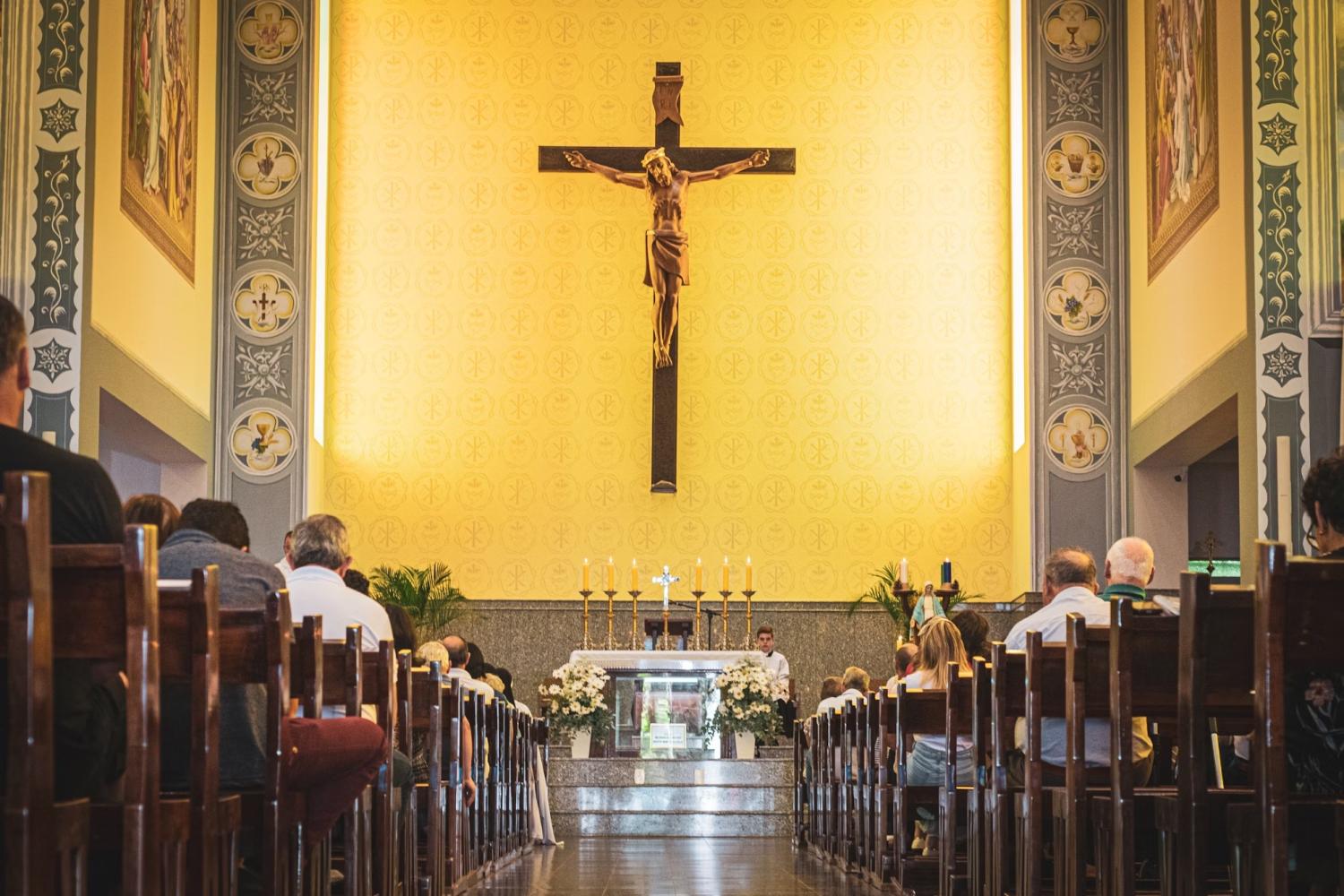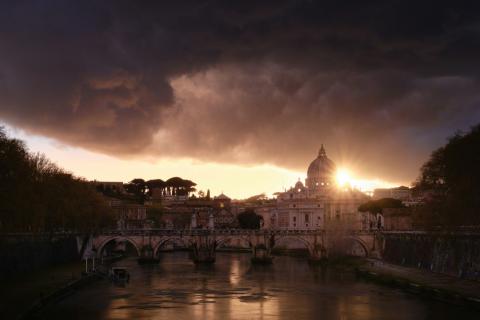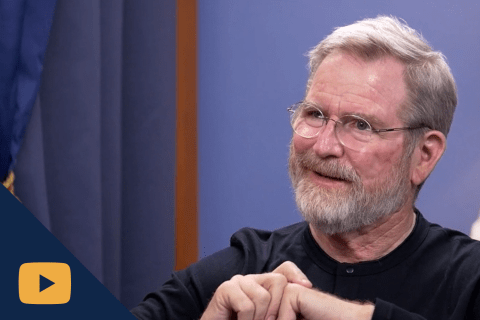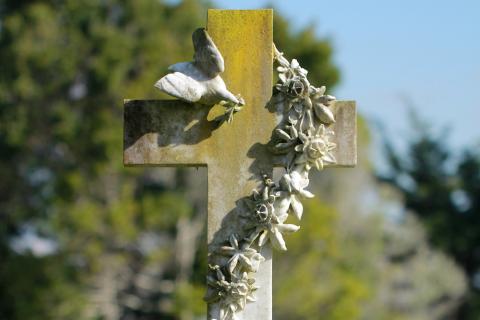
The following reflection is taken from a homily delivered by Msgr. James Shea in the Easter Season of 2024.
The high priest rose up and all his companions, that is, the party of the Sadducees, and, filled with jealousy, laid hands upon the Apostles and put them in the public jail. But during the night, the angel of the Lord opened the doors of the prison, led them out, and said, “Go and take your place in the temple area, and tell the people everything about this life.” When they heard this, they went to the temple early in the morning and taught. When the high priest and his companions arrived, they convened the Sanhedrin, the full senate of the children of Israel, and sent to the jail to have them brought in. But the court officers who went did not find them in the prison, so they came back and reported, “We found the jail securely locked and the guards stationed outside the doors, but when we opened them, we found no one inside.” When the captain of the temple guard and the chief priests heard this report, they were at a loss about them, as to what this would come to. Then someone came in and reported to them, “The men whom you put in prison are in the temple area and are teaching the people.” Then the captain and the court officers went and brought them, but without force, because they were afraid of being stoned by the people. (Acts 5:17-26)
Among the most frequent phrases in the mouth of Jesus was “The Kingdom of God” or “The Kingdom of Heaven.” He first announced his mission this way: “The time is fulfilled, and the kingdom of God is at hand” (Mark 1:15). We know what a kingdom is, or an empire, or a state: it is a visible polity, a corporate social entity that administers various aspects of life, to which people in a given area belong. Humans are social beings and have always gathered together in various kinds of kingdoms. Jesus came among us to establish such a social and corporate entity: a kingdom to which his followers would belong.
It's important for us to recall this aspect of the mission of Jesus because we live in a highly individualistic time when many view Christianity as a personal lifestyle choice, a philosophy that one might ascribe to amid others, a way of being that might help an individual negotiate life. Jesus is thus often seen as a kind of guru, someone who offered wise ideas for life that people could follow if it seemed good. Get your copy of “Tips for a Successful Life,” the recent bestseller by Jesus of Nazareth!
The Lord was up to something quite different. He was organizing a social body, establishing the reign of heaven in the midst of a disordered human world: John’s Gospel speaks of his coming as bringing light into darkness. At every point, Jesus speaks of what will be required to “enter” the kingdom, to be joined to the society he was establishing. But while this would be a real kingdom, it was to be a kingdom, not according to the ways of the fallen world, but of God.
Recall the conversation between Jesus and Pilate, the Roman Governor, from the John’s Gospel. Pilate asks Jesus: “Are you the king of the Jews?” Pilate had heard this title, and he knew – or thought he knew – what it meant to be king of the Jews. Jesus answers: “My kingship is not of this world; if my kingship were of this world, my servants would fight, that I might not be handed over to the Jews; but my kingship is not from the world." In this answer, Jesus acknowledges that he is a king, but he makes a crucial distinction. Kingdoms of the world, wherever they are, are ultimately founded on coercive force, and cannot survive unless they are powerful in some worldly way, militarily, economically, or by other means of exerting power. If Jesus were establishing yet another worldly kingdom, his followers would be fighting for him. But they aren’t doing that. Pilate, somewhat confused, then says: “So you are a king?” Jesus then gives an answer to Pilate – and to us – of great importance. He begins by responding: “You say that I am a king.” As if to say: yes, I am certainly a king, but not according to the idea of kingship you have. He then lays down the fundamental life principle of his kingdom: “For this I was born, and for this I have come into the world, to bear witness to the truth. Everyone who is of the truth hears my voice” (John 18:33ff).
The kingdom Jesus has founded – a real kingdom, a visible polity, a social organization – will not be founded on or extend itself by worldly means – by coercion or propaganda or political manipulation. Its life will come from an entirely different source. It will be propagated by the proclamation of truth, and will gather to itself only those who willingly submit to it because they perceive its truth and goodness. Its life will be the inner presence of God himself, and it will not depend on worldly supports for its continued existence. It will be unlike any other kingdom the world has known.
The book of the Acts of the Apostles is the account of Jesus continuing to establish his kingdom, now not in human form, but through the presence of the Holy Spirit who lives in his gathered followers. Acts goes out of its way to show us the dynamics of the kingdom: the way it grows, the kind of protection it is given, and the sources of its strength. Let’s note a few of these dynamics.
- First: It is clear that this kingdom is necessarily in conflict. In Acts 5, we read of the Apostles being thrown in jail near the start of their ministry. Why? As thieves? As murderers? As radical insurrectionists? No: for speaking the truth. The Gospel of John reveals the origin of this conflict: “The light came into the world, but people preferred darkness to light, because their works were evil. For everyone who does wicked things hates the light and does not come toward the light, so that his works might not be exposed. But whoever lives the truth comes to the light, so that his works may be clearly seen as done in God. To be a follower of Jesus and a member of his kingdom is necessarily to be involved in a battle.
- Second: The Apostles are able to contend with those who oppose them, not through normal means, but by divine power. It is not the Apostles who are establishing this kingdom: it is Jesus himself. In Acts 5, Jesus miraculously frees the Apostles from prison in a manner that could only have been very bewildering to the Sanhedrin. He was giving the authorities a sign, if they had eyes to see it, that they were opposing not men, but God himself.
- Third: The angel who sets the Apostles free gives them their battle orders: “Go into the temple and tell people everything about this life.” Go and speak the truth that Jesus has spoken to you. This is the weapon that will destroy enemy strongholds, not by might or by power, but by the Holy Spirit’s truth and goodness.
So the kingdom began, some two thousand years ago, and so it has continued down to our time. We are members of the same visible kingdom; we are among those who are “striving to enter by the narrow gate”; we are those among that “little flock” who are consoled by the promise of Jesus that “It is the Father’s good pleasure to give you the kingdom” (Luke 12:32). When the Church takes its stand upon truth and goodness, and looks to be sustained by the Holy Spirit, it mysteriously gains influence and position, and many come to its light and into its fold. When the Church forgets the true dynamics of the kingdom and thinks it will sustain itself and grow by means of worldly influence, by public relations, force, money, external show, whatever, it becomes weakened and distances itself from its true strength.
Here are four practical lessons from we can take from Scripture:
- First, let’s remember that the source of our strength is God himself, and as we unite ourselves with his truth and goodness, we become strong. Nothing can ultimately harm us if we remain in his love and his truth – not the worst of personal calamities, not the most tragic of external events.
- Second, let’s be careful not to imitate the fallen world’s way of evaluating the fortunes of the Church. We constantly hear of polls, statistics, observations, made from a worldly standpoint, that claim to tell us something of the likely fortunes of Christianity, how it is doing or will do, and we can be captured by such false evaluations and can develop a skewed eyesight. The power of the Church is always hidden from the world. The world often thinks the Church is in a strong position when in fact it has become enfeebled; the world thinks it is weak when in fact it is rising in strength. Never was the devil so destroyed or truth so triumphant as on that day at Calvary when it seemed that the coercive powers of the world had triumphed over the person who was himself truth and goodness. That pattern of crucifixion and resurrection is re-lived in every Christian life and in every age of the Church. It is the divinely given pattern for the growth of God’s kingdom.
- Third – and crucially – let’s be sure, especially during the Easter season, to remember the great joy that permeates God’s kingdom; a joy that nothing can quench because it is founded on the best news humanity has ever heard. These same Apostles who were thrown into jail, and then beaten and yelled at by the authorities, “left the presence of the council rejoicing that they were counted worthy to suffer dishonor for the name.” And what did they do after being so harshly treated? “Every day in the temple and at home they did not cease teaching and preaching Jesus as the Christ.” They knew they were in a fight; but they were happy fighters, at peace within themselves, unfazed and ready to speak and live the truth, knowing that God himself was sustaining them, and confident in his promises.
- Finally, let’s recognize again the great privilege and the high adventure we have been called to. God is calling each of us, in a way personal to us, to be a member of his kingdom and to help in its building. The prophet Daniel, generations before Jesus, gave the prophecy: “In those days the God of heaven will set up a kingdom which shall never be destroyed, nor shall its sovereignty be left to another people. It shall break in pieces all these kingdoms and bring them to an end, and it shall stand forever” (Daniel 2:44). That is the kingdom that Jesus first set up, the kingdom that has been sustained for millennia through every kind of human weakness within and opposition without, and of which we are fortunate members, provided we willingly follow our king. This is the kingdom, founded and fed by Jesus, whose light will eventually swallow up all darkness and set the human race free. There is no greater call, and no higher destiny, ever offered to mortal beings. Let us remember this, and rise to the dignity of who we are.


